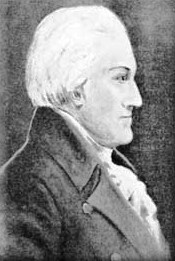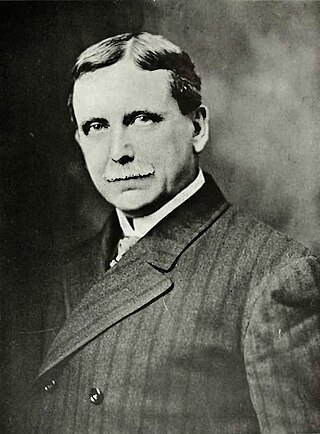Samuel Judah | |
|---|---|
 | |
| Died | 1876 |
Samuel B. H. Judah (1799 – 21 July 1876) was an American author, lawyer and poet. He was once imprisoned for libel. [1]
Samuel Judah | |
|---|---|
 | |
| Died | 1876 |
Samuel B. H. Judah (1799 – 21 July 1876) was an American author, lawyer and poet. He was once imprisoned for libel. [1]
Judah was born in New York City, in 1799, the son of Benjamin S. Judah. he was admitted to the bar in 1825. He practised law in New York City. He died 21 July 1876, also in New York City. [1]
His first play, a melodrama, The Mountain Torrent (1820) was a failure. [1] The Rose of Aragorn (1822) was another melodrama. He wrote a long romantic dramatic poem Odofriede, the Outcast the same year. He followed with a patriotic comedy A Tale of Lexington (1823) and in 1827 a novel The Buccaneers, a Romance of Our Own County. [2]
He also wrote, under the pen-name "Terentius Phlogobombos", [3] a scurrilous account of the literary and political life of New York. [2] The work Gotham and the Gothamites contained libellous statements about fellow playwright Mordacai Noah:
descended from Mordacai of old, that hanged Haman, for his desires, like that worthy's, are entirely bent towards the gallows
Despite the use of a pseudonym, Judah's authorship was discerned and he spent time in jail for criminal libel. [2]
A number of freethinking biblical dramas of the 1830s are ascribed to him, but his authorship is doubtful. [2]

Theodore Dehone Judah was an American civil engineer who was a central figure in the original promotion, establishment, and design of the First transcontinental railroad. He found investors for what became the Central Pacific Railroad (CPRR). As chief engineer, he performed much of the route survey work to determine the best alignment for the railroad over the Sierra Nevada, which was completed six years after his death.
"Yes, Virginia, there is a Santa Claus" is a line from an editorial by Francis Pharcellus Church titled "Is There a Santa Claus?", which appeared in the New York newspaper The Sun on September 21, 1897, and became one of the most famous editorials ever published. Written in response to a letter by eight-year-old Virginia O'Hanlon asking whether Santa Claus was real, the editorial was initially published anonymously and Church's authorship was not disclosed until after his 1906 death. As the editorial became popular over the years, The Sun began republishing it during the Christmas season, including every year from 1924 to 1950, when the paper ceased publication.

The Federalist Papers is a collection of 85 articles and essays written by Alexander Hamilton, James Madison, and John Jay under the collective pseudonym "Publius" to promote the ratification of the Constitution of the United States. The collection was commonly known as The Federalist until the name The Federalist Papers emerged in the twentieth century.

Joseph Walton Losey III was an American theatre and film director, producer, and screenwriter. Born in Wisconsin, he studied in Germany with Bertolt Brecht and then returned to the United States. Blacklisted by Hollywood in the 1950s, he moved to Europe where he made the remainder of his films, mostly in the United Kingdom. Among the most critically and commercially successful were the films with screenplays by Harold Pinter: The Servant (1963) and The Go-Between (1971).

John Peter Zenger (October 26, 1697 – July 28, 1746) was a German printer and journalist in New York City. Zenger printed The New York Weekly Journal. He was accused of libel in 1734 by William Cosby, the royal governor of New York, but the jury acquitted Zenger, who became a symbol for freedom of the press.

Profiles in Courage is a 1956 volume of short biographies describing acts of bravery and integrity by eight United States senators. The book profiles senators who defied the opinions of their party and constituents to do what they felt was right and suffered severe criticism and losses in popularity as a result. It begins with a quote from Edmund Burke on the courage of the English statesman Charles James Fox, in his 1783 attack upon the tyranny of the East India Company in the House of Commons, and focuses on mid-19th-century antebellum America and the efforts of senators to delay the American Civil War. Profiles in Courage was widely celebrated and became a bestseller. It includes a foreword by Allan Nevins.
Judah ben Samuel of Regensburg, also called Yehuda HeHasid or 'Judah the Pious' in Hebrew, was a leader of the Chassidei Ashkenaz, a movement of Jewish mysticism in Germany considered different from the 18th-century Hasidic movement founded by the Baal Shem Tov.

Richard Grant White was one of the foremost literary and musical critics of his day. He was also a prominent Shakespearean scholar, journalist, social critic, and lawyer. He was born and died in New York City.

Ben-Hur: A Tale of the Christ is a novel by Lew Wallace, published by Harper and Brothers on November 12, 1880, and considered "the most influential Christian book of the nineteenth century". It became a best-selling American novel, surpassing Harriet Beecher Stowe's Uncle Tom's Cabin (1852) in sales. The book also inspired other novels with biblical settings and was adapted for the stage and motion picture productions.

Ben-Hur is a 1959 American epic religious film directed by William Wyler, produced by Sam Zimbalist, and starring Charlton Heston as the title character. A remake of the 1925 silent film with a similar title, it was adapted from Lew Wallace's 1880 novel Ben-Hur: A Tale of the Christ. The screenplay is credited to Karl Tunberg, but includes contributions from Maxwell Anderson, S. N. Behrman, Gore Vidal, and Christopher Fry.
Barent Gardenier was an American lawyer and politician from New York. He was a United States representative from 1807 to 1811.
The Federal Farmer was the pseudonym used by an Anti-Federalist who wrote a methodical assessment of the proposed United States Constitution that was among the more important documents of the ratification debate. The assessment appeared in the form of two pamphlets, the first published in November 1787 and the second in December 1787.

James Grant Wilson was an American editor, author, bookseller and publisher, who founded the Chicago Record in 1857, the first literary paper in that region. During the American Civil War, he served as a colonel in the Union Army. In recognition of his service, in 1867, he was nominated and confirmed for appointment as a brevet brigadier general of volunteers to rank from March 13, 1865. He settled in New York, where he edited biographies and histories, was a public speaker, and served as president of the Society of American Authors and the New York Genealogical and Biographical Society.

Charlotte Elizabeth Tonna was a popular Victorian English writer and novelist who wrote under the pseudonym Charlotte Elizabeth. She was "a woman of strong mind, powerful feeling, and of no inconsiderable share of tact." Her work focused on promoting women's rights and evangelical Protestantism, as seen in her book Protection; or, The Candle and the Dog, in which the following characteristic quote appears: "Our greatest blessings come to us by prayer, and the studying of God's word." As Isabella A. Owen remarked in 1901, "She was above all else an anti-Romanist, a most protesting Protestant." Harriet Beecher Stowe wrote of her memoir Personal Recollections (1841): "We know of no piece of autobiography in the English language which can compare with this in richness of feeling and description and power of exciting interest."

There are several explanations as to the origin of the Book of Mormon. Adherents to the Latter Day Saint movement view the book as a work of divinely inspired scripture, which was written by ancient prophets in the ancient Americas. Non-Mormon theories of authorship propose that it is solely the work of man.

Henry Beekman Livingston Jr. has been proposed as being the uncredited author of the poem A Visit from St. Nicholas, more popularly known as The Night Before Christmas. Credit for the poem was taken in 1837 by Clement Clarke Moore, a Bible scholar in New York City, nine years after Livingston's death. It was not until a further twenty years had passed that the Livingston family knew of Moore's claim, and it was not until 1900 that they went public with their own claim. Since then, the question has been repeatedly raised and argued by experts on both sides.

Baron Anne-Honoré-Joseph Duveyrier, pen-name Mélesville was a French dramatist. The playwright Mélesville fils was his son.

Charlton Greenwood Ogburn was a lawyer who served as a public official in various capacities from 1917 through to the 1930s. He was employed as legal counsel both for government bureaucracies and labor organizations. His most widely recognized work was undertaken as counsel for the American Federation of Labor in the 1930s.

Julius Chambers, F.R.G.S., was an American author, editor, journalist, travel writer, and activist against psychiatric abuse.

Andrew Carpenter Wheeler, best known by the pen name Nym Crinkle, was a 19th-century American newspaper writer, author, and drama critic. He was one of the most prolific critics of his day, known for his pungent and fierce criticism.
{{cite book}}: |work= ignored (help)